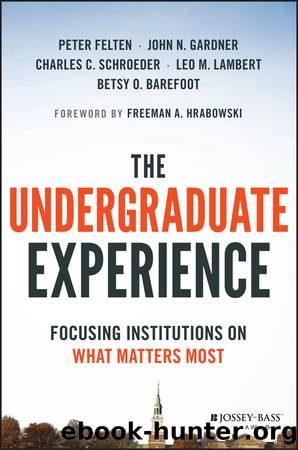The Undergraduate Experience by unknow

Author:unknow
Language: eng
Format: epub
ISBN: 9781119051190
Publisher: Wiley
Published: 2016-05-16T00:00:00+00:00
Leverage the Benefits of Alignment
Effective institutions realize the full educational potential of existing initiatives when they are linked, aligned, and integrated in creative ways. Rather than launching entirely new programs to meet each emerging or lingering need, colleges and universities first should consider whether better alignment of existing resources and efforts could achieve the desired ends.
For instance, although academic advising is a common practice in almost all institutions, Richard Light (2001) contends that âgood advising may be the single most underestimated characteristic of a successful college experienceâ (p. 81). Unfortunately, on many campuses the quality and consistency of the advising varies widely. The roots of this problem are complex but often are linked to limited rewards, absence of a clear aim and purpose, inequitable or unrealistic advising loads, overemphasis on advising as a course selection and registration event rather than an educational planning process, and, perhaps most importantly, lack of alignment with complementary, co-curricular experiences (e.g., internships and academic clubs) designed to promote learning and success. This neglect of quality advising certainly affects, at least to some degree, student engagement, learning, and success. For example, according to the 2014 National Survey of Student Engagement, although first-year students who met regularly with academic advisers reported multiple positive outcomes, about one in three first-years met an adviser only once or not at all during the academic year. And even those who did meet with advisers indicated that they provided little or no information regarding the importance of high-impact practices such as first-year seminars, learning communities, study abroad, and undergraduate research.
To address these kinds of issues, Florida International University (FIU) recently implemented a comprehensive advising program dubbed the Graduation Success Initiative (GSI). The program is new, but the resources and practices involved largely existed on campus already, just not aligned with each other. The program engages students with advisers in a systematic, aligned process that incorporates an initial exploration of majors, an occupational interest inventory that links the students' passions and goals to FIU majors, an automated tracking tool called My eAdvisor that provides students and advisers feedback regarding progression on the Majors Map, and a Panther Degree Audit, which ensures that various steps in the graduation pathway are being met in a timely, appropriate fashion. The GSI not only assures that students will take the right courses in the correct sequence but also exposes students to learning and engagement opportunities on and off campus.
Miami University in Ohio also aligned existing resources to reach a significant goal by linking academic advising with residential life for first-year students. Live-in advisers serve as directors in residence halls that range in size from fewer than 100 to 350 students. Because of the frequent, natural interaction in the dorm, these academic advisers get to know their students on a personal basis and, as a result, engage students in a range of issues that go beyond the traditional emphasis of advising on course selection and registration.
West Virginia University's Adventure West Virginia (AWV) program has had particularly impressive outcomes from aligning existing resources.
Download
This site does not store any files on its server. We only index and link to content provided by other sites. Please contact the content providers to delete copyright contents if any and email us, we'll remove relevant links or contents immediately.
The Art of Coaching Workbook by Elena Aguilar(51136)
Trainspotting by Irvine Welsh(21608)
Twilight of the Idols With the Antichrist and Ecce Homo by Friedrich Nietzsche(18600)
Fangirl by Rainbow Rowell(9211)
Periodization Training for Sports by Tudor Bompa(8236)
Change Your Questions, Change Your Life by Marilee Adams(7717)
This Is How You Lose Her by Junot Diaz(6856)
Asking the Right Questions: A Guide to Critical Thinking by M. Neil Browne & Stuart M. Keeley(5740)
Grit by Angela Duckworth(5576)
Red Sparrow by Jason Matthews(5449)
Paper Towns by Green John(5163)
Room 212 by Kate Stewart(5090)
Ken Follett - World without end by Ken Follett(4705)
Housekeeping by Marilynne Robinson(4420)
The Sports Rules Book by Human Kinetics(4367)
Double Down (Diary of a Wimpy Kid Book 11) by Jeff Kinney(4252)
Papillon (English) by Henri Charrière(4238)
The Motorcycle Diaries by Ernesto Che Guevara(4069)
Exercise Technique Manual for Resistance Training by National Strength & Conditioning Association(4048)
